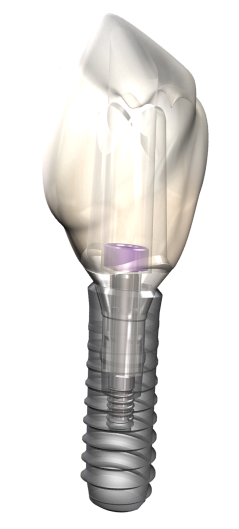What Are Dental Implants?
Dental implants are a remarkable tooth replacement option because they have all the benefits of natural teeth. According to historical records, people have attempted to replace human teeth with implants as far back as 2500 BCE.
Over the centuries, the methods and materials used to create dental implants have developed significantly. In ancient civilizations, such as the Egyptians and Mayans, there are accounts of individuals using crude forms of implants made from shells or stones. Fast forward to the 20th century, and advancements in dental technology led to the first modern dental implants in the 1960s thanks to the pioneering work of Dr. Per-Ingvar Brånemark, who discovered the process of osseointegration.
This groundbreaking discovery laid the foundation for the dental implants we know today, providing a stable and lasting solution for tooth loss. While our ancestors used different materials—including ivory, animal bone, and shell—today, we typically opt for artificial teeth crafted from high-quality biocompatible materials to emulate the look and feel of natural teeth.
The most common type of implant is an endosteal implant which is surgically inserted into the jaw. These implants won't slip and slide around in your mouth like conventional dentures, and they don't have to be removed during eating and brushing. In fact, once placed, successful implants keep your jaw bone strong and healthy.
Dental implants offer many wonderful benefits because they:
- Are realistic and seamlessly blend in with adjacent teeth.
- Renew your self-confidence.
- Prevent potential health conditions or functional issues from arising and can prevent the need for additional procedures in the future.
- Help control bone loss and maintain your facial aesthetics when the implant post fuses with the jaw bone.
- Can replace a single tooth, multiple teeth, or an entire arch of teeth.
- Allow you to enjoy your favorite foods again.
During your consultation, your oral surgeon or dental provider will work with you to determine if dental implant therapy is the right treatment for you and your condition.
The consultation is not just a formality; it’s a vital step in ensuring the best possible outcomes for your dental health. During this meeting, your oral surgeon will take the time to discuss your medical history, specific needs, and expectations regarding dental implants. It’s also an opportunity for you to ask questions, voice concerns, and gain a clear understanding of the entire process. This collaborative approach helps to ensure that you feel comfortable and informed as you embark on your journey to restore your smile.
The Dental Implant Procedure
Our oral surgeons have received extensive training in implant dentistry and achieve high rates of implant success. Here's what you can expect when you receive artificial tooth implants at our practice:
The consultation. This is typically the first time that you visit our office. One of our oral surgeons will evaluate your condition and create a treatment plan that suits your needs. At this appointment, the surgeon may take 3D scans for computer-aided dental implant planning to ensure the ideal implant positioning for your needs and concerns.
Bone grafting. Because your surgeon will place the implant in bone, you need enough jaw bone to support it. Should you have jaw bone loss, bone grafting can increase the quantity of bone through reconstructive dental surgery. This will be performed prior to your implant placement to allow adequate time for bone healing. At the end of the healing phase, you will be a candidate for dental implant use.
The day of surgery. When the anesthesia has taken effect, your oral surgeon will make a small incision in your gum tissue, insert the titanium screw into your jaw bone, and stitch the surgical site closed. This part of the dental implant process, also known as osseointegration surgery, will be performed before your permanent implant placement. This allows adequate time for the metal implant to fuse with the jaw bone so it can mimic a strong, natural tooth root for your artificial tooth.
Recovery. It's very important that the healing process after dental implant surgery goes smoothly to ensure long-term implant survival and avoid clinical complications. You must take proper care of your oral health, particularly around the surgical site. You will be given detailed postoperative instructions, which will encourage you to maintain excellent dental hygiene and adhere to a temporary soft food diet that will ensure a smooth and speedy recovery. Not following the instructions may create problems with your implant treatment or cause complications that may result in implant failure, which can impede long-term success.
After your dental implant surgery, proper care is crucial to ensure a smooth recovery. Beyond following the detailed postoperative instructions provided by your surgeon, consider implementing these additional aftercare tips:
- Stay Hydrated: Drinking plenty of water aids in healing and helps maintain optimal oral hygiene.
- Avoid Strenuous Activity: For the first few days post-surgery, refrain from vigorous exercise to prevent undue stress on the surgical site.
- Monitor Your Diet: In addition to sticking to a soft food diet, incorporate nutrient-rich foods like smoothies, soups, and pureed fruits and vegetables to support healing.
- Follow-Up Appointments: Attend all scheduled follow-up visits to monitor the healing process and address any concerns early on.
The crown placement. After assessing the implant's initial stability and tracking evidence of osseointegration over time, your oral surgeon or restorative dental care professional will place your permanent custom crown over the implant. This artificial crown is specifically made to match the color, shape, and size of your healthy teeth, making your implant indistinguishable from your natural teeth.
Read in other langauges
Benefits
Dental implants preserve your facial structure by preventing jaw bone loss. They replace the root of a missing tooth, encouraging bone stimulation and keeping your jaw healthy, which helps maintain your natural appearance and avoid early aging signs.
With proper care, dental implants can last for a lifetime. Once they integrate with the jaw bone, they provide a stable, durable foundation for replacement teeth, eliminating the need for frequent adjustments required by other options like dentures.
Implants support the health of your mouth by keeping neighboring teeth in their correct positions. Acting as a tooth root, they help prevent movement of surrounding teeth, reducing the risk of alignment issues.
Implants feel like your own teeth, offering security and comfort that’s unmatched by dentures. Firmly anchored in your jaw bone, they stay in place, allowing you to chew, speak, and go about daily activities without discomfort.
Whether you need to replace one tooth or several, dental implants offer a flexible and customized approach. They can be tailored to match your specific dental needs, ensuring a natural, functional smile.
A restored smile can work wonders for your confidence. Implants allow you to smile, speak, and eat confidently, knowing your teeth are secure and natural-looking.
Types of Dental Implants
Dental implants consist of an implant post, usually made from titanium or zirconia, and a crown that mimics a natural tooth. The post is surgically placed into the jaw bone, providing a stable base for your replacement tooth.
When considering tooth replacement options, it’s essential to understand how dental implants compare to alternatives like dentures and bridges. While dentures can offer a temporary solution, they may slip and require regular adjustments. Bridges can be effective for replacing one or two missing teeth but involve altering adjacent healthy teeth. In contrast, dental implants stand out due to their permanence, functionality, and ability to preserve bone structure, offering a superior option for those looking for a long-term solution.
At 7x7 Dental Implant & Oral Surgery Specialists in San Francisco, CA, our team of expert oral surgeons offers a range of implant options to restore your smile:
- Single Implants: This option includes a post, abutment, and custom-made crown to replace one missing tooth. The implant is placed directly in the jaw bone, creating a durable, long-lasting replacement that blends seamlessly with your natural teeth.
- Multiple Implants: When several teeth are missing, multiple implants can support bridges or partial dentures. These implants provide a secure solution for missing teeth, helping prevent bone loss and improving oral function.
- Full-Arch Implants: For those missing all their teeth, full-arch restoration involves placing several implants to hold a complete arch of replacement teeth. This permanent option offers a comfortable alternative to traditional dentures.
- Zygomatic Implants: Patients with severe bone loss in the jaw can benefit from zygomatic implants, which are anchored in the cheekbone. This technique provides a solution for those who are not candidates for traditional implants due to bone loss.
- Zirconia Implants: A metal-free option, zirconia implants offer an aesthetic and durable alternative to titanium implants. These ceramic implants are ideal for those seeking a natural-looking, metal-free solution for tooth replacement.
What Are Same-Day Dental Implants?
Immediate implants, also known as same-day dental implants, are placed directly into the socket during the same visit as your tooth extraction. By opting to replace your missing tooth immediately, you can reduce the number of appointments needed for full restoration. Our skilled oral surgeons can perform this procedure as long as there is sufficient jaw bone to support the implant.
In cases where there isn’t enough bone, we may need to perform a bone graft following the extraction. Depending on your specific situation, we may be able to place both the implant post and bone graft together, allowing them to heal simultaneously. Alternatively, we might insert the graft first and have you return later to place the implant post. We’ll go over all the details of your treatment during your initial consultation, where we use advanced 3D scans to evaluate your jaw bone and overall oral health.
Traditional dental implants consist of three key parts: a titanium post, a connecting abutment, and a custom crown. During the healing process, the titanium post integrates with your jaw bone in a process known as osseointegration, forming a stable and lasting foundation. Implant posts serve as a replacement for natural tooth roots, restoring functionality and maintaining bone health. While the procedure to place a single implant typically takes under an hour, the exact timing may vary depending on the complexity of your case.
After surgery, you may leave with your permanent teeth already in place or be fitted with a temporary crown to wear while your implants heal. You can trust that we will keep you informed and involved throughout the entire process, creating a smooth and confident oral surgery experience.
Types of Anesthesia
We offer many forms of anesthesia to make you feel comfortable, including:
What If I’m Missing Multiple Teeth?
Although adult teeth are meant to last a lifetime, factors like periodontal disease, trauma, or other health conditions can lead to tooth loss or necessitate extractions. One of the reasons dental implants are such a popular solution for replacing missing teeth is their remarkable flexibility. Whether you’re missing a single tooth or several across different areas of your mouth, implants can be tailored to your needs.
Traditional dental bridges are often used to replace multiple teeth that are adjacent to each other. While they can effectively improve the appearance of your smile, these bridges don’t integrate with the jaw bone, which means they won’t help preserve bone density over time. Moreover, placing a traditional bridge requires the healthy teeth on either side of the gap to be ground down, which can weaken otherwise strong teeth without contributing to your overall oral health.
On the other hand, implant-supported bridges provide the same cosmetic benefits but with added advantages. Rather than relying on natural teeth, these bridges are anchored by dental implants, which are placed directly into the jaw bone. This approach not only avoids damaging healthy teeth but also helps maintain bone health, as the implants stimulate the jaw just like natural tooth roots.
If your missing teeth aren’t next to each other, individual dental implants can be placed in each gap to fully restore your smile. Dental implants are a durable solution, and with the right care, they can last a lifetime, making them an appealing choice for many patients.
Should You Choose Dental Implants or Dentures?
While both dental implants and dentures offer ways to restore your smile, there are important differences between the two treatments. Dentures, which rest on top of your gums, mimic the look of natural teeth but don’t interact with your jaw bone. When not fitted properly, dentures may shift when you talk or eat, leading to discomfort or irritation. They also wear down over time, requiring replacement every few years.
In contrast, dental implants are surgically embedded into the jaw bone, where they fuse with the bone itself. Each implant acts as a replacement for a natural tooth root, keeping the jaw bone healthy and stable. Implants can replace any number of missing teeth, and the crowns are custom-made to match your natural teeth in both shape and color. For patients missing an entire set of teeth, dental implants can support a fixed denture, offering a stable and permanent alternative to removable dentures. Unlike traditional dentures, which need to be taken out for cleaning and eating, implant-supported teeth remain securely in place, providing a long-term solution that doesn’t require frequent replacement.
Cost of Dental Implants in San Francisco, CA
Patient conditions, any additional procedures, the types of implants used, and needs vary. All these factors impact the cost of treatment. No matter your needs, our staff works hard to make sure that our care is offered at competitive prices for the San Francisco, CA area.
Your oral surgeon will discuss the total cost of your procedure during the first visit, keeping you informed every step of the way. The average cost of dental implants varies depending on the number of implants you need, whether you require additional procedures like bone grafting or tooth extractions, the details of your dental insurance, and your choice of anesthesia during implant surgery.
7x7 Dental Implant & Oral Surgery Specialists offers oral surgery services at competitive prices for the San Francisco area, enabling more patients to access excellent oral health care.
We would be happy to talk to you and configure an accurate cost estimate that considers every factor. Please contact our office and request a consultation, where we will discuss your cost of dental implants. We also offer financing to help make your care more affordable.
We are happy to make arrangements for a payment plan, but this must be discussed prior to your procedure. When your oral surgeon is designing your treatment plan during the initial consultation, we will outline the cost of your treatment. If you are interested in financing your dental implant treatment, please notify our front desk staff during or before your consultation appointment. Visit our dental implant financing page to learn more about your financing options.
Our office accepts many insurance companies and payment plans to make dental implant surgery as accessible as possible.
Dental Implants in San Francisco, CA
Looking for a high-quality, long-lasting, natural-looking tooth replacement in San Francisco, CA? 7x7 Dental Implant & Oral Surgery Specialists is the go-to destination for dental implants. With six oral and maxillofacial surgeons on staff, we are here to help you find a better, more beautiful smile.
Hear From Dental Implant Patients
These patients can tell you about their firsthand experience undergoing dental implant treatment at our office.
Reviews From Our Dental Implant Patients
"Hi, my name is Kathy, I’m from Pacifica, and I had some dental implants done with Dr. Scharf. The implant is the best because it’s your tooth. It doesn’t move, it doesn’t like, if you have to take it out, it’s not like you have to worry about putting it somewhere in a glass or a box—it’s in! If you can do it, go for for it. Dr. Scharf is a wonderful person—just the best. Totally skilled, he’s a professional in every sense of the word. He cares about you. He’s engaged. That matters because then, you know that what you’re going to have done is going to be successful, and mine have. So I’ve been very fortunate to know him and I, like I said, I can’t speak highly enough. I’ve had a great experience here, and I really recommend Dr. Scharf."
"Hi, my name is Betty from San Francisco. I had a dental implant done by Dr. Scharf. The office here at West Portal is one of the friendliest, most professional offices I’ve ever been to. Everyone is always kind. They’re very efficient. It’s really a pleasure to come here. Before I came for surgery, I was really very nervous. I’d never had a tooth pulled, and I also had never been through the implant procedure before. Dr. Scharf is so professional and so skilled, and the minute he walks into the room, you know that he knows what he’s doing and he makes you feel so much better about the whole process. It worked one hundred percent, and it was a great experience. For my friends and family in Brisbane and Colma, I highly recommend 7x7 Oral Surgery."
"My name is Sybil, I live in San Francisco, California, and the procedure I had done was a tooth extraction. When I met Dr. Patwardhan, she was really calm. She had a very gentle manner about her. The best thing for me at 7x7 Oral Surgery was that I knew I had the best oral surgeon working on me. The procedure itself went really well, and I had no follow-up problems. I had a very wonderful and positive experience at 7x7 Oral Surgery."
"When I walked in, into the practice, it was such a good feeling. The staff was really welcoming. They treat me really warmly. My doctor was an excellent doctor, really friendly, really nice. I felt so comfortable with her throughout all the procedure. My procedure actually went really easy. Recovery went so fast, and everything went beyond my expectations. I will highly recommend 7x7 Dental Implant & Oral Surgery to all my friends in Millbrae."
"Hi, my name is Andrew, and I had a dental implant with Dr. Duncan. When I first came to Dr. Duncan’s office, it was very clean, organized. Dr. Duncan is very personable and came in, just kind of chatted and got to know each other and he was able to balance kind of comforting myself with respect to the procedure and letting me know kind of what was coming and then, you know, just nice conversation. The surgery went absolutely fine, and what was amazing to me is that I didn’t need to call him up for any questions or anything afterwards. I was surprised how easy the recovery went. Dr. Duncan made me feel comfortable and the fact that he explained everything clear, it all went well. I highly recommend 7x7 Oral Surgery."
Frequently Asked Questions
1. HOW LONG IS THE RECOVERY AFTER A DENTAL IMPLANT?
The recovery time following dental implant placement surgery is three to six months. Your age, jaw bone condition, and your body's healing abilities affect the length of this process. Throughout the healing period, you'll attend appointments to ensure the best chance of long-term implant survival. At our practice, we have high rates of successful implants, even with complex treatments.
2. WILL THE DENTAL IMPLANT PROCEDURE HURT?
You may experience some discomfort after any surgical procedure. We work diligently to make sure all our patients are comfortable while in our care. We offer multiple anesthesia options so that you can be at ease and relaxed during your procedure.
3. HOW DO I TAKE CARE OF DENTAL IMPLANTS?
Dental implants require easy care: brush, floss, and see your dentist for regular checkups. With proper oral hygiene and dental care, you can expect long-term implant survival and a beautiful, restored smile for years to come.
4. Can I get a dental implant years after an extraction?
Even if many years have passed since an adult tooth was extracted, you can replace it with a dental implant. When a missing tooth is left untreated, the jaw bone will atrophy in that area over time. Nearby teeth can shift into the empty space, and facial features may begin to sag due to a weakened jaw.
If there is enough jaw bone to support the implant, your oral surgeon can place the implant post into the empty socket, even if years have passed since the tooth was removed. If the jaw bone has atrophied, we can place a bone graft into the empty socket. This will stimulate nearby bone to grow around the graft, resulting in new, healthy bone. Once healed, there will be enough of a foundation to support a dental implant.
5. OTHER QUESTIONS?
We are here to help! If you are interested in replacing teeth with dental implants, talk to our staff to schedule an appointment with our trusted team of oral surgeons.
Where the Bay Area Finds Better Smiles
For over 40 years, 7x7 Dental Implant & Oral Surgery Specialists has helped San Francisco find healthier and more beautiful smiles. We are proud to serve Bay Area patients with exceptional oral surgery services delivered with compassionate care. With four practice locations, we are able to bring our expertise to the entire city. To learn more about how we can help you achieve your oral health goals, contact our office to schedule a consultation. We look forward to welcoming you soon!


















